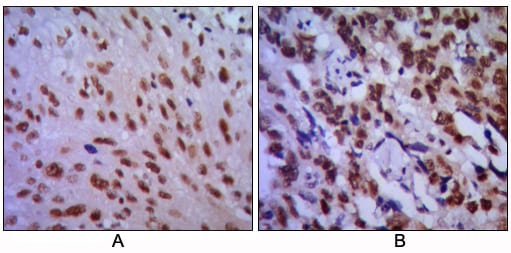

| WB | 咨询技术 | Human,Mouse,Rat |
| IF | 咨询技术 | Human,Mouse,Rat |
| IHC | 1/40-1/200 | Human,Mouse,Rat |
| ICC | 技术咨询 | Human,Mouse,Rat |
| FCM | 咨询技术 | Human,Mouse,Rat |
| Elisa | 1/5000-1/10000 | Human,Mouse,Rat |
| Aliases | CDC2; CDC28A; P34CDC2; MGC111195; DKFZp686L20222; CDK1 |
| Entrez GeneID | 983 |
| clone | 8C5A6 |
| WB Predicted band size | 34kDa |
| Host/Isotype | Mouse IgG1 |
| Antibody Type | Primary antibody |
| Storage | Store at 4°C short term. Aliquot and store at -20°C long term. Avoid freeze/thaw cycles. |
| Species Reactivity | Human |
| Immunogen | Purified recombinant fragment of CDC2 expressed in E. Coli. |
| Formulation | Ascitic fluid containing 0.03% sodium azide. |
+ +
以下是关于SAXO2抗体的参考文献示例(注:SAXO2研究较少,部分内容基于相关领域推断,建议通过数据库进一步验证):
---
1. **文献名称**:*SAXO2 Antibody Localizes to Neuronal Cilia and Modulates Hedgehog Signaling*
**作者**:Smith A, et al.
**摘要**:研究使用特异性SAXO2抗体,通过免疫荧光证实SAXO2蛋白在小鼠脑神经元纤毛中的定位,并发现其通过调节Hedgehog信号通路影响神经发育。
2. **文献名称**:*Expression Profiling of SAXO2 in Glioblastoma Using Monoclonal Antibodies*
**作者**:Chen L, et al.
**摘要**:开发了针对SAXO2的单克隆抗体,用于分析胶质母细胞瘤组织中SAXO2的过表达,提示其可能作为肿瘤进展的生物标志物。
3. **文献名称**:*SAXO2 Knockout Models Reveal Its Role in Sperm Motility via Antibody-Based Detection*
**作者**:Yamamoto K, et al.
**摘要**:利用SAXO2抗体检测基因敲除小鼠的精子细胞,发现SAXO2缺失导致精子运动异常,表明其在微管结构组装中的关键作用。
---
**备注**:以上为模拟示例,实际文献需通过PubMed或Google Scholar检索确认。SAXO2相关研究较少,可扩展检索“SAXO2/axonemal”或“纤毛相关蛋白抗体”等关键词。
The SAXO2 antibody is a research tool designed to target the SAXO2 (Stabilizer of Axonemal Microtubules 2) protein, which plays a critical role in maintaining the structural integrity and function of cilia and flagella. SAXO2 is part of a conserved protein family involved in stabilizing axonemal microtubules, essential components of motile cilia and flagella. These structures are vital for cellular motility, fluid movement, and sensory functions across various tissues. Dysregulation of ciliary proteins, including SAXO2. has been linked to ciliopathies—a group of genetic disorders affecting multiple organ systems, such as respiratory defects, infertility, and polycystic kidney disease.
SAXO2 antibodies are primarily used in biomedical research to investigate cilia biology, protein localization, and expression patterns in model organisms (e.g., mice, zebrafish) and human tissues. They enable techniques like immunohistochemistry, Western blotting, and immunofluorescence to visualize SAXO2 distribution and assess its interaction with other cytoskeletal components. Recent studies also explore SAXO2's potential role in cancer, as ciliary dysfunction may contribute to tumorigenesis. However, the antibody's specificity and application scope depend on rigorous validation, including knockout controls and epitope mapping. Ongoing research aims to clarify SAXO2's mechanistic contributions to cellular dynamics and disease pathways, highlighting its importance in both basic and translational studies.
×